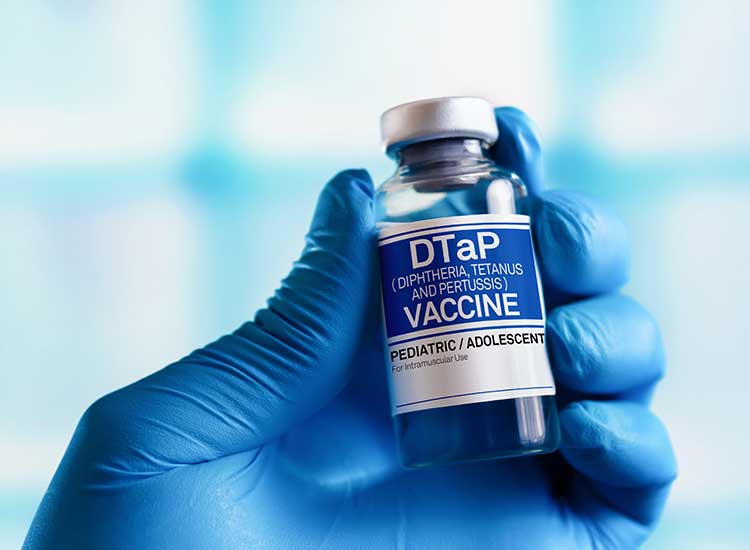How to Prevent Diphtheria? – How to prevent diphtheria? One of them is complete diphtheria vaccination. Diphtheria vaccination can be given from the baby’s age of 2 months. This is important to do so that the immune system can be awakened early. For more details, see the following review.
Diphtheria disease
Diphtheria is a serious bacterial infection that is contagious. Diphtheria is caused by infection with the bacteria Corynebacterium diphtheriae. Bacterial infections generally attack the mucous membranes of your nose, throat and sometimes your skin. In addition, severe bacterial infections can damage the heart, nerves and kidneys. Organ damage due to bacterial infection can get worse if you don’t get immediate medical treatment.
Diphtheria can attack people of all ages, from children to adults. When bacteria successfully enter and infect, the bacteria will release toxins (poison) in the body. The toxins released by bacteria will affect the respiratory tract and cause a thick gray membrane to appear. The membrane that appears will cover the tissue in the voice box, throat, nose and tonsils. As a result, it will cause difficulty when breathing and swallowing.
How to Prevent Diphtheria?
Diphtheria is an infectious disease and poses a life-threatening risk if not treated immediately. Therefore, you need to take precautions so as not to become infected with this disease. How to prevent diphtheria that you can do.
1. Diphtheria Vaccination
An effective way to prevent diphtheria is to get a diphtheria vaccination. Diphtheria vaccination is very important to build the body’s immune system to fight bacteria. The diphtheria vaccine is usually combined with tetanus and whooping cough (pertussis) vaccines . The latest version of this combination vaccine is known as DTaP. The DTaP vaccine is generally given from childhood. The vaccination stage consists of a series of five injections, usually given in the arm or thigh in children of the following ages:
- 2 months
- 4 months
- 6 months
- 15 to 18 months
- 4 to 6 years
After receiving the vaccination injection, the child will feel a little uncomfortable, such as a fussy baby, fever, drowsiness, or pain at the injection site.
2. Booster Vaccine
After receiving complete diphtheria vaccination in childhood. You need to get a diphtheria booster vaccine . Booster vaccines are still needed because the body’s immune system in fighting diphtheria will decrease over time. Therefore, children who have previously received complete vaccinations should get their first booster vaccine around 11 or 12 years of age.
After the first booster vaccination , the next booster vaccine is recommended 10 years later, and repeated at 10 year intervals. The type of booster vaccine that will generally be given is Tdap, namely a combination diphtheria vaccine for adolescents aged 11 to 18 years and adults who have never received the Tdap vaccine.
3. Be aware of the symptoms of diphtheria from an early age
Another way to prevent diphtheria is to be aware of the symptoms of diphtheria early on. Diphtheria does not always show early symptoms. However, when symptoms appear, you need to be alert. Common symptoms of diphtheria include:
- Sore throat
- Fatigue
- Fever
- Swollen neck glands
- Respiratory problems due to the appearance of a gray layer that blocks the nose and throat
- Difficulty swallowing (dysphagia)
- Having nerve, kidney or heart problems (if the bacteria enters the bloodstream)
If you feel any of the symptoms above, immediately undergo a medical examination to get the right diagnosis.
5. Implement Healthy and Clean Living Behavior
Diphtheria bacteria easily develop and spread in densely populated areas with low levels of hygiene. Apart from that, inadequate sanitation facilities can also increase the risk of bacteria growing and causing infection. Therefore, it is important to adopt healthy and clean living habits to avoid diphtheria disease. Several steps to implement healthy and clean living behavior that you can take:
Wash your hands with soap before or after doing activities, for example exercising, working and other activities that may expose you to bacteria.
Clean the home environment, especially areas that have a high potential for bacteria to live.
Make sure the room has good air circulation so that the room is not damp. Damp rooms are vulnerable to being a place for various germs, viruses and bacteria that cause disease to reproduce, including diphtheria.
Consume healthy and nutritionally balanced foods to improve the body’s immune system. A good immune system can help fight bacterial infections that enter the body. Apart from that, you can also compensate by doing regular exercise and completing your vitamin needs from various food sources and supplements.
Keep open wounds from getting bacterial infections. For example, covering the wound with a bandage to prevent it from becoming infected with bacteria.
5. Carry out a Health Check
Routine health checks can also be a preventive measure. By carrying out regular health checks, you can find out the health condition of your body. This benefit will help you to detect disease early, including diphtheria. The earlier diphtheria disease is recognized, the sooner prevention efforts can be taken so that it does not get worse.
6. Antibiotics
Apart from being used to treat diphtheria, antibiotics can also be used to prevent bacterial infections. Especially for those of you who have had close contact with people infected with diphtheria. Antibiotics work by preventing bacteria from multiplying more in the body. However, you need to consult a doctor first regarding the correct dosage before taking antibiotics.
Knowing how to prevent diphtheria can help you avoid this disease. Get complete vaccination to prevent diphtheria. If you have never received a diphtheria vaccination, immediately consult a doctor about the next steps. That’s a review of how to prevent diphtheria.
Link Terkait :


No Responses